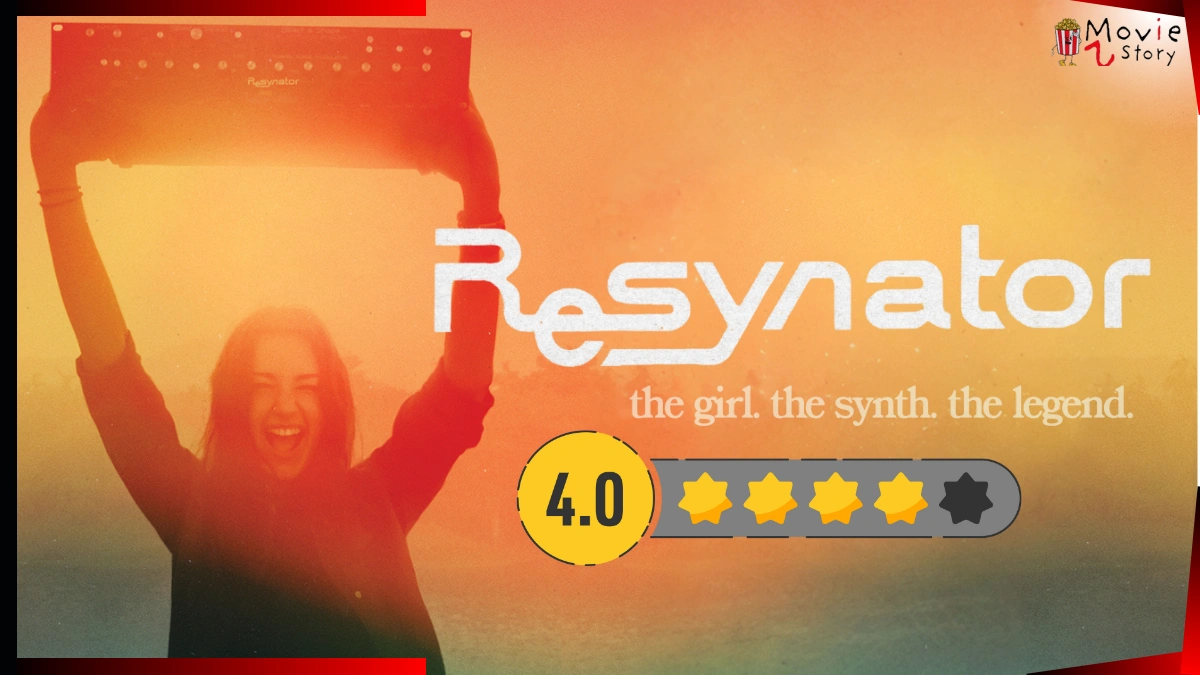Resynator movie review: Resynator (2024), directed by Alison Tavel, emerges as a heartfelt and deeply personal documentary that blends music history, personal discovery, and emotional introspection. While documentaries often explore larger-than-life figures or grand events, Resynator stands out for its intimate focus on an overlooked musical invention and the filmmaker’s emotional journey to reconnect with her late father. The film, which had its world premiere at SXSW 2024, quickly established itself as a poignant and fascinating work that resonates deeply, regardless of the viewer’s background.
Alison Tavel’s story starts with a simple but powerful premise: the discovery of a mysterious prototype synthesizer her father, Don Tavel, invented before his tragic death. This invention, named the Resynator, becomes the symbolic thread that ties together Tavel’s quest to learn about her father, uncover his overlooked contributions to music technology, and confront the complexities of his legacy. What begins as a niche exploration of a musical artifact soon evolves into a universal story about family, identity, and the pursuit of understanding.
Resynator movie review
At its core, Resynator explores two parallel stories: the history of an innovative but forgotten musical device and Tavel’s personal journey to reconnect with her father. This dual narrative structure makes the film both engaging and emotionally rich. For music enthusiasts, Resynator offers a fascinating look into the world of synthesizers and music technology during the 1970s and 1980s. For viewers drawn to human stories, it delivers a touching portrait of a woman searching for answers about a father she never knew.
Tavel’s father, Don Tavel, was a gifted musician and inventor who poured his passion and ambition into the creation of the Resynator. Unlike the more widely known Minimoog synthesizers of its time, the Resynator stood out for its ability to convert organic sounds into electronic ones. This innovative feature distinguished it from other instruments, but despite its potential, the device never achieved commercial success. The reasons behind this failure are gradually revealed as the film unfolds, painting a picture of an artist grappling with personal demons and professional disappointments.
Tavel’s discovery of the Resynator in her grandmother’s attic becomes the catalyst for her journey. From dusty storage boxes to cutting-edge recording studios, the film follows her as she pieces together not only the device but also the fragmented story of her father’s life. Her curiosity and determination drive the narrative forward, creating a compelling blend of mystery, music history, and emotional exploration.
For fans of music technology, Resynator offers a treasure trove of fascinating details. Tavel’s investigation into the Resynator‘s design, mechanics, and history will appeal to gearheads and music nerds alike. Watching her and a team of technicians work to restore the device is both engaging and educational. The film captures the joy and wonder of unearthing a long-lost piece of musical history, with moments of discovery that feel almost magical.
The inclusion of interviews with famous musicians adds another layer of intrigue to the film. Artists like Peter Gabriel, Gotye, Fred Armisen, and Grace Potter try out the Resynator, marveling at its unique sound and potential. These cameos not only highlight the instrument’s significance but also provide moments of levity and awe. For viewers unfamiliar with synthesizers, these segments serve as accessible and entertaining introductions to the world of music technology.
The film’s exploration of the Resynator is accompanied by impressive archival footage and materials that shed light on Don Tavel’s creative process and ambitions. These visuals help contextualize the device within its time period while also highlighting the dedication and artistry behind its creation.
While the film’s technical aspects are impressive, Resynator finds its true emotional power in Tavel’s personal journey. Having lost her father at just ten weeks old, Tavel grew up with a limited understanding of who he was. Raised in a loving household with her mother and stepfather, she never felt an urgent need to learn about her biological father. However, the discovery of the Resynator changes everything.
As Tavel investigates the device, she begins to uncover layers of her father’s life that had long been hidden. Conversations with family members, friends, and colleagues reveal a complex portrait of a man who was both brilliant and troubled. While Don Tavel’s creativity and ambition were undeniable, he was also haunted by personal demons, including depression and suicidal thoughts. These revelations add a raw and honest dimension to the film, as Tavel confronts uncomfortable truths about her father’s struggles.
One particularly moving moment comes when Tavel reads confessional letters her mother had kept hidden. Her mother’s reasoning—“I never wanted her to think badly of him”—speaks to the protective instincts that often shape how families handle grief and memory. By sharing these moments with the audience, Tavel invites us to reflect on the ways we remember our loved ones and the stories we choose to preserve.
The film’s willingness to explore these darker, more complex aspects of Don’s life sets it apart from more sanitized personal documentaries. Tavel’s bravery in asking difficult questions and confronting painful truths gives the film an emotional depth that feels both genuine and cathartic.
From a visual standpoint, Resynator balances its mix of interviews, archival footage, and animated sequences with skill and purpose. The animated segments, created by Danny Madden, lend the film a unique and whimsical flair. While some reviewers note that these sequences feel slightly superfluous, they nonetheless add personality and charm to the film. In particular, the animations depicting Don Tavel as a Superman-like figure reflect Alison’s childlike admiration for the father she never knew.
The pacing of the film is another of its strengths. Tavel carefully spaces out her discoveries, allowing each new revelation to land with emotional impact. Her engaging screen presence and natural curiosity make her a relatable guide through this deeply personal story. Whether she’s speaking with family members, tinkering with the Resynator, or interviewing famous musicians, Tavel’s earnestness and sincerity shine through.
One of the film’s most compelling aspects is its dual focus on both Alison and Don Tavel. While the story begins as an investigation into Don’s invention, it gradually becomes a reflection of Alison’s own journey of self-discovery. As she learns more about her father’s life and struggles, she also gains a deeper understanding of herself and her motivations.
The film raises thought-provoking questions about legacy, memory, and the ways we connect with those we’ve lost. Why does Alison feel so driven to restore the Resynator? What does she hope to learn about her father—and herself—in the process? These questions linger throughout the film, giving it a reflective and introspective quality that resonates long after the credits roll.
As Resynator reaches its conclusion, it delivers moments of genuine surprise and emotional catharsis. The connections Alison uncovers in the film’s final act are both unexpected and deeply moving. These revelations not only provide closure to her journey but also underscore the film’s central message: that the people we love are never truly gone as long as we keep their memories alive.
The final scenes of the film, which bring together Alison’s personal journey and the legacy of the Resynator, are particularly powerful. By the time the credits roll, viewers are left with a profound appreciation for the film’s emotional honesty and heartfelt storytelling.
Summary
Resynator (2024) is a remarkable documentary that succeeds on multiple levels. For music lovers, it offers a captivating exploration of a forgotten piece of music technology and the brilliant mind behind it. For those drawn to human stories, it delivers an emotional and introspective journey of loss, discovery, and connection.
Alison Tavel’s willingness to confront the complexities of her father’s legacy—and to share her own personal journey with the audience—makes Resynator a standout film. It avoids the pitfalls of self-indulgence that often plague personal documentaries, instead delivering a story that feels both universal and deeply personal.
With its mix of music history, emotional storytelling, and heartfelt reflection, Resynator is a film that resonates on a profound level. Whether you’re a music-tech enthusiast or simply someone who appreciates a well-told story, Resynator is a documentary that deserves to be seen, felt, and celebrated.
Top 5 Rotten Tomatoes Reviews
Much like the device itself, “Resynator” hardly feels revolutionary among its contemporaries, but there’s enough charm and heart beneath it to make it stand out from a crowded field – Clint Worthington, RogerEbert.com
There’s a vulnerability to the filmmaking here that’s very admirable – Brian Tallerico, RogerEbert.com
It’s bursting with heart, and genuinely moving in its improbable journey to close the distance between the dead and the living – Kimberley Jones, Austin Chronicle
Rather amazing and completely fascinating, even if you don’t have a particular interest in the archaeology of musical instruments. … Resynator becomes a dual biography of both her father and herself. … It’s a fabulous film – Peter Martin, ScreenAnarchy
Tavel puts the emotion first, making it a powerful experience. She builds and builds to a singular conclusion, and it’s impressive to see something so intricate from a debut feature – Alan French, Sunshine State Cineplex
Top Movie Ratings
| Imdb | 8.1/10 |
| Rotten Tomatoes | 100% |
Latest Release Movie:

